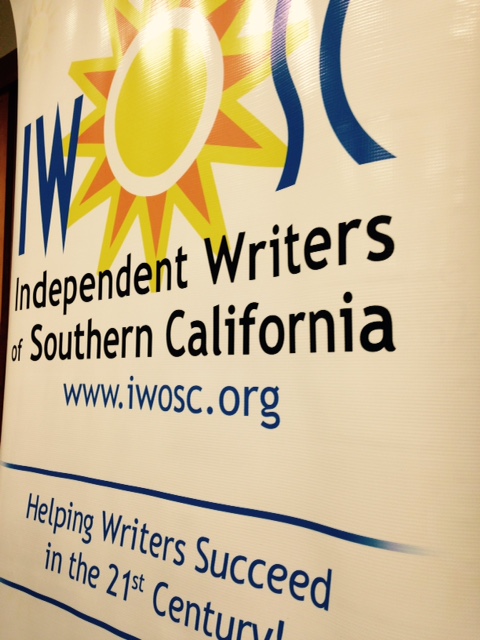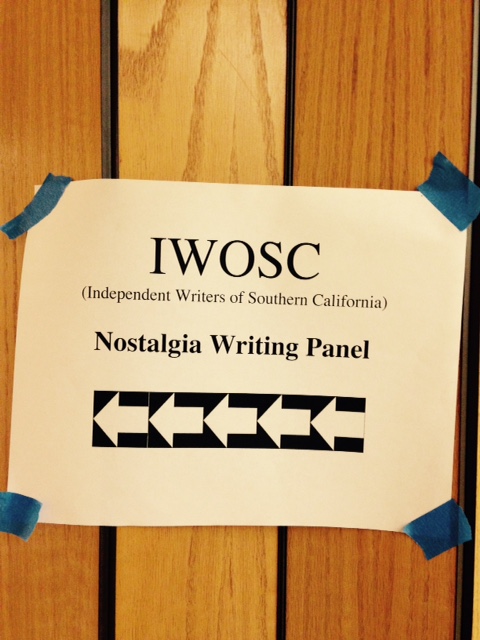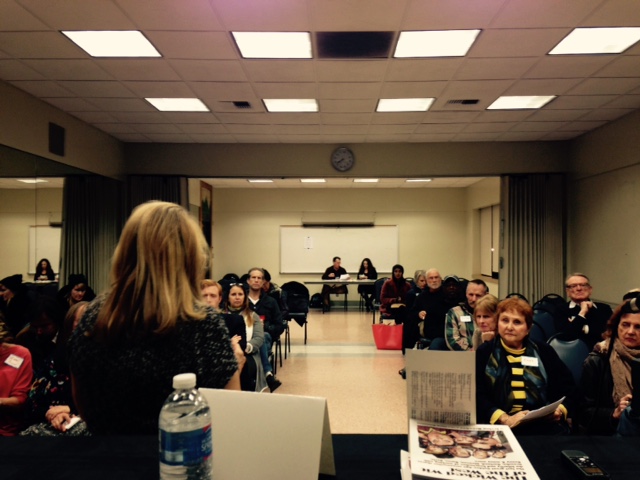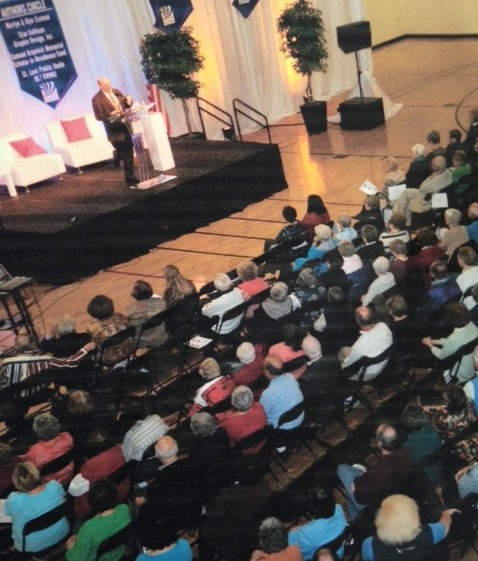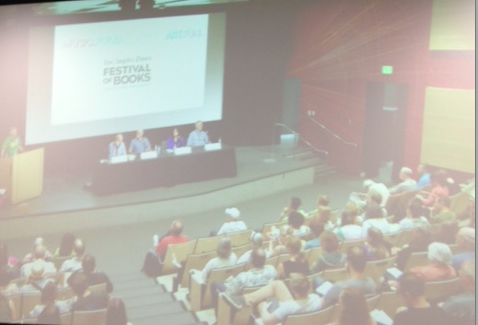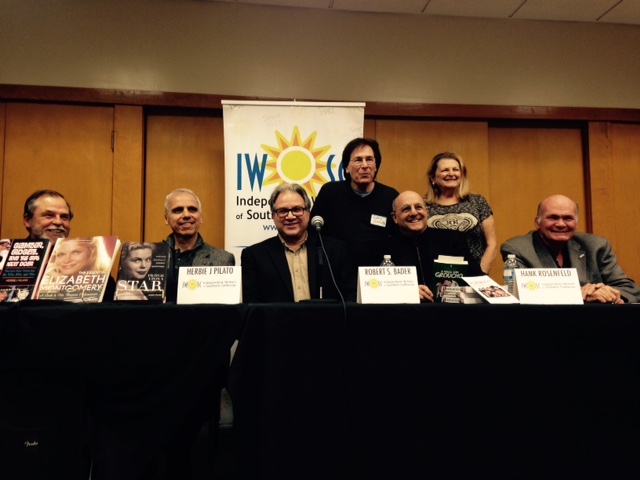Nostalgic for Conversation
Last week I found myself in a long discussion with four writers about of all things, nostalgia. I enjoy quoting a view (ala Nietzche I think) that sees nostalgia as, “looking backwards with bullshit in both eyes.” But there I was on a panel sponsored by the Independent Writers of Southern California (IWOSC) held at the Veterans Memorial Building in Culver City called, “Writing Nostalgia: When the Past Sings, Make it Zing.”
So I’m not sure what I’m doing here, but when the IWOSC host Gary Young starts things off quoting Noel Coward, who said to a starlet before her show: “May you have a warm hand on your opening!” I warm to the idea of a raucous couple of hours. When moderator Bob Birchard asks the panel how each of us became nostalgic, I lean into the microphone and give them the Nietzche quote (how’s that for Zing!), but not wanting to bum out the evening, say actually, “I’m nostalgic for good conversation and can’t wait to hear some tonight.”
LET’S MEET OUR PANEL
I figure I’ll just take my cues from the venerable experts I’m lucky to be among here, like Jordan R. Young, show biz historian and author of many books including “Spike Jones Off The Record.” He recalls a time in the 1950s, “before camp, before nostalgia!” when he would call up Silent Movie actors names he saw listed in the phone book.
That’s determined journalistical sleuthing; I really admire how Jordan sought out celebrities, holding conversations with classic figures like King Vidor and John Carradine. Young founded Past Times Publishing in the 1980s and one of his books, “The Laugh Crafters: Comedy Writing in Radio and TV’s Golden Age,” taught me a lot more about Irving Brecher, subject of “The Wicked Wit of The West” memoir I wrote with Irv. Young’s many biographies include, “Spike Jones Off The Record.”
Robert S. Bader, producer of PBS specials on Dick Cavett and Bing Crosby, reveals how he didn’t know it was being nostalgic when as a kid he got into the Marx Brothers. But he did know that upon sharing his interest, some other people found it “cool” too, he’d made a group of friends forever. Consequently, one of his books, “Groucho Marx and Other Short Stories and Tall Tales,” has been translated into dozens of languages, “including Catalan.”
Moderator Birchard, author of “Cecil B. Demille’s Hollywood,” makes a point of describing his fellows on the dais as: “Not Historians,” and asks how we do our research. Herbie J Pilato, author of “The Essential Elizabeth Montgomery” suggests tracking down photos via stock agencies like Globe and Photofest. I ask the entire panel, “Hey whatever happened to Black Star, does anyone remember them?” When I first saw their photo credits in magazines as a kid I thought they were an African-American agency, because around the same time I learned that “Black is Beautiful.” The panel thought Black Star is long gone or part of a larger stock house.
Pilato is a former actor and NBC page who says he likes to do books about “positive things” and in fact, founded the nonprofit Classic TV Preservation Society, dedicated to shows that reflect this, including, “Life Goes On,” “Kung Fu,” “That Girl,” and “Gidget.”
I say I think Herbie’d be a great host on the TVLand channel; he was years ahead with his explorations of Montgomery’s “Bewitched.”
“I’m working on it,” he says.
Next, Robert S. Bader thrills the Culver faithful with a research story of discovering two hundred Marx Brothers photos in an attic from, “that early 1900s period of the Brothers performing on the road.”
Look for Bader’s book devoted to Minnie’s boys’ pre-Hollywood movie career in 2016. Something nobody it seems has covered: their earliest vaudeville shows and stage plays. I can’t wait to read it and see that trove of pix — I also plan to pick Bader’s brain about getting my “Wicked Wit of the West” translated into Catalan.
First, a fascinating conversation ensues, taking on the touchy subject, “what’s real and what’s myth” when it comes to writing our biographies and memoirs. You know, who said what, who said whaaaaaa. Why do we care and should we care??
Before tonight’s event I’d been talking to a filmmaker who told me he won first prize for his documentary at a recent festival. I offered congratulations. He thanked me, and then added, “I paid for it.” The thousands of dollars he donated (see SPONSORSHIP) resulted in getting an award at the festival. I understand that’s how that works; the tinsel has long blown away after living twenty years in this town. But regarding books, can’t we all just believe?
INQUIRING IWOSCERS WANT TO KNOW
One woman tells the panel she’d like to write a biography, but read a Marilyn Monroe book that was nothing but erotic stories never documented in any history. Well, three panelists say, you can write anything you want about a person no longer living. (Just because it isn’t true doesn’t mean it can’t also be a lousy read.) A man who wants to write about a B-movie actress who did pin-ups an died young says he can’t remember her name.
Should it matter if a life story is true to the page its printed upon? Neal Cassady offered this advice to Jack Kerouac after reading an early draft: “Embellish.” Robert Bader tells us, regarding his Marx Bros research, how Groucho would give two answers to your question, “and then tell you both of them were lies.”
So to the man writing about the model and the woman biographer, I offer tips from a fake “IWOSC mini-seminar,” telling them each not to worry, but YOU’VE GOT TO HIT THE TYPEWRITER BROTHER! CREAT YOUR OWN MYTH! Get the dang thing written, in other words. To someone waiting for permission from a subject’s estate, I offer: “Write the book already; it’s easier to be forgiven than it is to get permission.” (And thinking now of Scoop Nisker, the unique radio man at KSAN in 1970s San Francisco who ended every broadcast: “If you don’t like the news, go out and make some of your own!”)
In fact, I add, motioning at my fellow panelists, “Any one of these gentlemen up here will write you a perfectly good biography or memoir.” (Thinking of myself on the prowl always for next writing gig.)
A question comes to Herbie Pilato: “You can write about Elizabeth Montgomery, but how can you write about a TV show,” a man asks, because that program — product — is a corporate property.
“Nah,” Pilato aces it. “There have been ninety books about Star Trek, none of them authorized by Gene Roddenberry.” (I thought of chiming in with this touching Gene Roddenberry story I heard that afternoon on NPR, but in the interest of keeping things moving…anyway, SEE END OF STORY)
Perhaps the most provocative point all evening is made by Jordan R. Young, after, I blurt out: “Well isn’t everybody an archivist now? Able to look up anything on the web and assume they’ve done the research?” Jordan Young says he thinks the millennial generation is the last who actually do archive things.
“The next generation won’t.”
THE LAST ARCHIVISTS?
The first archivists, in his field he says, were the people who audio taped TV shows. Robert Bader makes a joke about a guy who audiotapes silent movies and I playfully punch him in the side. Later, after I blurt out something else, he will say, “You’re scaring me.” (Which you love to get that from an adult.) But I don’t care; Bader, who said he loved the research part of his job, was very generous earlier in the evening, praising “The Wicked Wit of the West” which he told the audience he read before beginning his new Marx Bros book.
Anyway, now that I realize my fellow panelists are the kind of people who tape TV shows on reel-to-reel audio, I must confess to being part of that techno-nerd set, and plead guilty to taping The Bill Cosby Show, but with the caveat that this was in 1971 and with a cassette recorder.
So by the time moderator Birchard, an award-winning film editor, asks when we first got the bug to write, I don’t even get a chance to contribute. (Jordan Young wrote in high school and although now retired still writes plays and about plays for the Orange County Register, for example.)
After a too long segment on getting Clearance and Rights, the panel comes to a grinding halt when one of my fellow authors expounded re something called “The Digital Millennium Act of ____” whenever. I saw no place to drop in that sweet Gene Rodenberry story even though it was only going to be in the form of a link to the IWOSCERS to npr.org (See END OF STORY for link)
Actually, the best part for me came about halfway in when I realized: this is not nostalgia, these are pop historians. Young described his work as, “the diggings of a cultural archeologist.”
Afterwards, I ask Jordan Young’s wife if she thought the panel’d covered the basics pretty well — the legal aspects, dealing with a subject’s family members, getting their memories straight. Yes, she says, but it did skirted “into the weeds” a bit. I agree, thinking back on the panelist talking about “looking for stills from Nancy Drew movies,” and another bringing up Emil Jannings (1884-1950) in regards to an Ernst Lubitsch (1892-1947) bon mot, I was like, “Check please!” and wanted to blurt, “Where’s my MTV?” into the microphone I had to share with Bader, but boy wouldn’t that have sounded ancient…
Inside Baseball to be sure, but this was about nostalgia.
SEMI PROFESSIONAL PANELIST LOOKING FOR TWO-HOUR POSITION
I only wish I’d been a better panelist. When the moderator said he recalled Shakespeare’s “Richard III” appearing on TV’s “Omnibus” in the 1950s, I asked why, with today’s circus of stations we have no Shakespeare channel. “Springsteen claimed in song there were ’57 Channels and nothing’s on,” I blurted. “But today there’s like a zillion aren’t there? Thornton Wilder said at the end of every civilization there’s a period of great creativity and production. Look at the stuff being churned out, the platforms, the programming!”
At another point came this question: “How long a period of time before you can write about something nostalgic and how long can you continue to?” Bob Birchard, author of “King Cowboy: Tom Mix and the Movies,” said he figured there was, “Around a thirty-year window for nostalgia.”
I think I must have lost them when I quoted the Nietzche right at the top, adding, “So continue your panel. If you dare,” before surrendering the mic to Robert S. Bader, who later would say, well, you know, the thing about “scaring” him.
Finally, at the panel’s completion, when you either rush off to greet well-wishers or potential customers for the books you’ve brought, or remain seated there at the dais, basking all self-actualized, awaiting groupies, I received one woman who came up to me to tell me the story of young actor in the closet who marries a woman, Hollywood style, but she kills herself, and a year later with the same gun, he kills himself.
“Great Story, huh?”
Um, but I did make two nice contacts after that, one said she had a friend in Madrid who could translate the Italian version of THE WICKED WIT OF THE WEST from its Italian version — A PESCA CON GROUCHO — into Spanish. Then I’ll translate from Spanish back into English to see if any jokes exist at all.
Someone else asked me to speak in a few months at a writers’ meeting. “But,” she added, “you have to behave.”
Yikes. Went worse than I thought, this evening. No wonder, the Los Angeles Times Festival of Books never booked me to appear, despite my applying for “Hollywood Biography” “Memoir” “Senior Memoir” and “Humor” panels, and despite having written for the paper for ten years including two stories about Irv Brecher, THE wicked wit of the west, so named by Groucho himself, read my business card: “Hello I must be writing.”
Perhaps I was bitter about never making it onto their rarified USC daises in late April every year since 1995? Listen, I told the lady, I spend a lot of time alone writing, so when I do make public appearances — signings and slide shows pretty much — they tended to be over the top.
But hey, the IWOSC lady wanted to book me, didn’t she? I think I’d like to learn how to become a professional panelist. So if anyone reading this knows of any panels, I think I could bring semi-comic relief to the proceeding. I mean, the guy’s own wife thought he got into the weeds. This is from someone who gets all his classic figures and arcane references, right?
Finally, one more IWOSC member came up after and said she’d seen me reading TWWOTW at Chevalier’s Books on Larchmont in Los Angeles. “Remmber when you gave me the Groucho mask?” she asked. I didn’t, but I told her I should have given her a kiss instead, and leaning past the microphone stand push into her as she stood on her tippy toes and I thought: That’s showin’ em!. If a semi-professional panelist caint get at least one kiss, he aint doin his job.
IWOSC Panel
Nostalgia Writing/When the Past Sings Make it Zing
Monday, November 16, 2015
7:30 to 9:15 p.m.
Jordan R. Young, Herbie J Pilato, Robert S. Bader, Gary Young, HR, Flo Selfman, Bob Birchard
WEBSITES REFERRED TO IN THIS STORY
Independent Writers of Southern California
http://iwosc.org/calendar/index.html#monthly_meeting
Jordan R. Young
http://www.thecommentarytrack.com
Herbie J Pilato
http://classictvps.blogspot.com
Gene Roddenberry story
http://www.npr.org/sections/thetwo-way/2015/11/16/455931394/the-oatmeal-remembers-star-trek-creators-heroic-plane-crash-rescue
Chevalier’s Books
chevaliersbooks.com
